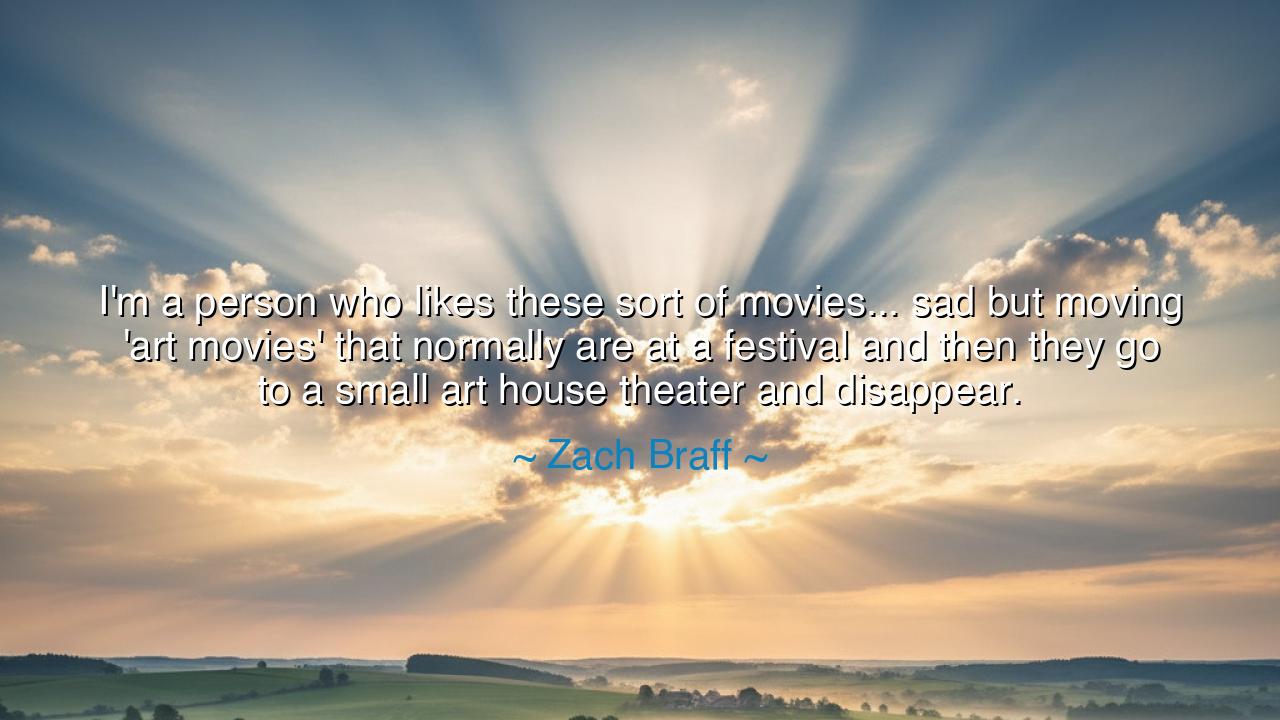
I'm a person who likes these sort of movies... sad but moving
I'm a person who likes these sort of movies... sad but moving 'art movies' that normally are at a festival and then they go to a small art house theater and disappear.






The words of Zach Braff reveal a deep love for the quiet and often overlooked treasures of storytelling: “I’m a person who likes these sort of movies… sad but moving ‘art movies’ that normally are at a festival and then they go to a small art house theater and disappear.” In this statement we see the longing of one who values the beauty of the fragile, the temporary, and the deeply human. For these films, though they do not conquer the world with wealth or fame, carry within them a truth that burns brightly for those willing to see.
The art movie, as Braff calls it, is more than entertainment. It is a mirror held to the soul, daring to explore grief, longing, vulnerability, and hope in forms too delicate for the grand stage of commerce. These films are often sad but moving, not because they despair of life, but because they show it in its rawness—unpolished, imperfect, yet profoundly meaningful. They are the modern equivalent of the ancient tragedies performed in the amphitheaters of Greece, where men and women gathered to weep, to purge their emotions, and to understand the fragile glory of being human.
The origin of such films lies in the heart of the artist who refuses to bow to spectacle. Where great studios chase the applause of the crowd, the creator of the art house film seeks instead to whisper to the solitary soul. Just as the poet Sappho’s verses, once shared on fragile papyrus, outlived the mighty monuments of kings, so too do these modest films carry a resonance that survives long after their fleeting appearances in festivals and small theaters. They may disappear, as Braff says, but in truth they remain alive in the hearts of those they touched.
Consider the example of Roberto Rossellini’s Rome, Open City, born out of the ashes of World War II. It was not crafted for fame or wealth, but as a cry of truth in a devastated land. Shown first in small venues, it was raw, painful, and sad, yet deeply moving. Though it might have disappeared like many other films, it instead ignited Italian neorealism and influenced generations of directors. This story proves that what seems fragile and fleeting can echo across time, shaping the spirit of art itself.
There is wisdom in Braff’s preference. To love the sad but moving work is to love honesty over comfort, depth over glitter, substance over noise. The easy path is to seek only joy and distraction, but the deeper path is to let art remind us of sorrow and mortality. For without sadness, we cannot know the full power of beauty. These films teach us not merely to escape life, but to see it more clearly, to embrace the moments that wound us as well as the ones that heal.
The lesson is plain: do not measure art—or life—by how widely it spreads or how loudly it is praised. Instead, measure it by the truth it awakens in the heart. If a single poem, a fleeting song, or a small art movie changes even one life, then it has not disappeared. Its spirit endures, like a flame carried through the darkness, unseen by many, but priceless to those it lights.
Practical action is clear: seek out these hidden works. Do not feed only on what the world shouts from its stages, but listen also for the quiet voice that whispers in forgotten theaters and overlooked books. Support those who create not for wealth but for truth. And in your own life, dare to cherish the fleeting and fragile—the moment of kindness, the silent beauty of a sunset, the sad but moving truths that will never appear on any billboard, but will live forever in your soul.
Thus, Braff’s words remind us of an ancient truth: greatness is not always loud, and truth is not always triumphant in the eyes of the world. Sometimes it appears only briefly, in the hidden corners, and then seems to vanish. But if we treasure it, if we let it move us, it becomes eternal. What disappears from the screen remains alive in the heart—and there, no power can erase it.






AAdministratorAdministrator
Welcome, honored guests. Please leave a comment, we will respond soon